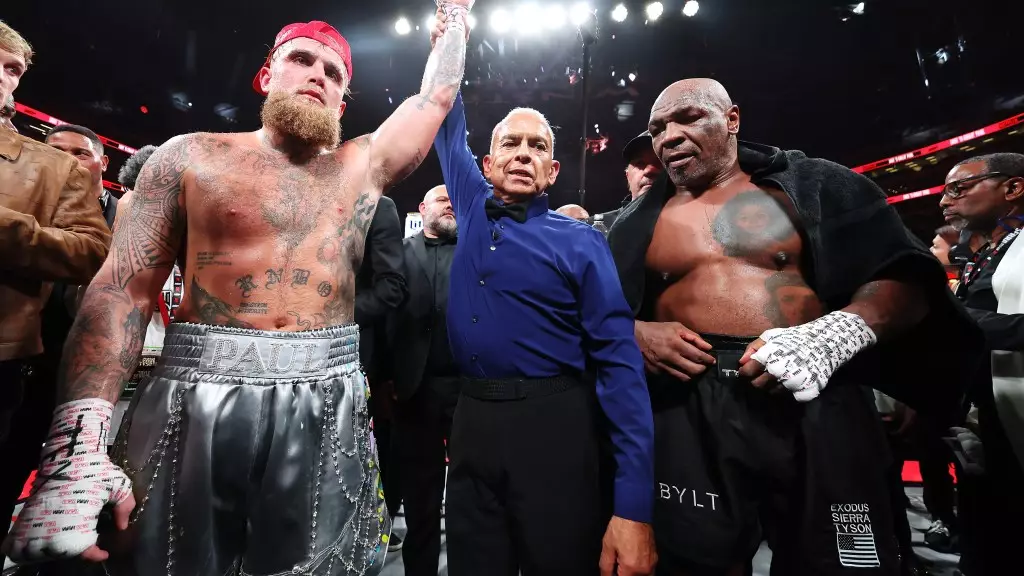The bout between Jake Paul and Mike Tyson on November 16 has elicited a variety of reactions, especially with the aftermath creating a buzz among skeptics and conspiracy theorists. Allegations of a fixed fight have gained traction, questioning the authenticity of a spectacle that was not just a boxing event but also a significant promotional milestone for its backers. This article explores the surrounding discourse, analyzing claims made by participants, promoters, and critics.
The claims suggesting that the Paul vs. Tyson fight was rigged are bolstered by preconceived notions about the backgrounds of both fighters. Jake Paul, a former social media personality turned professional boxer, holds a noteworthy record of 11-1, but not without facing scrutiny concerning his choice of opponents. Meanwhile, Tyson, despite being a boxing legend, is nearly twice Paul’s age and largely inactive in professional boxing for years. Critics, including former boxing champion Oscar De La Hoya, contend that the fight’s outcome was orchestrated. However, Paul’s Most Valuable Promotions (MVP) organization counterargues that the financial implications of a fixed fight would be illogical.
MVP’s assertion emphasizes that organizing a rigged match could jeopardize lucrative deals, especially considering that it was Netflix’s inaugural foray into live sports broadcasting. Choosing to disregard integrity for the sake of a scripted outcome could undermine future ventures with the streaming giant, damaging the reputation they’ve sought to cultivate. The potential financial loss stemming from losing credibility among fans and viewers would far outweigh any short-term financial benefits.
Less than a week after the fight, MVP made a formal statement to counteract what they termed unfounded speculation. In a bold assertion, Nakisa Bidarian, co-founder of MVP alongside Paul, stated that the allegations undermined the efforts put forth by both combatants. He stressed that rigging a boxing match is not just unethical; it is also a federal crime in the United States. The Texas Department of Licensing and Regulation sanctioned the fight, ensuring that both fighters entered the ring with the expectation of actual competition.
Bidarian’s remarks reveal the inherent contradiction in the public’s view of the fight. There is a tendency to dismiss Paul’s achievements, as skeptics claim the path from social media fame to boxing success lacks credibility. They fail to recognize that both athletes put their reputations on the line, as any dealings involving a non-competitive match would not just undermine the sport but also reflect poorly on their respective careers.
The bout attracted an audience that blended both boxing enthusiasts and casual fans, culminating in over 70,000 attendees at the venue and approximately 108 million global viewers on Netflix. This crossover appeal marks a significant moment for boxing as it seeks to rejuvenate its audience amid criticisms of declining viewership and diminishing star power.
Jake Paul’s narrative as an outsider challenging the traditional boxing establishment resonates with many who often feel disconnected from the sport’s historical narratives. Moreover, the spectacle surrounding the match, including pre-fight media promotions and audience engagement, prepared the ground for a new breed of boxing engagement that captures a younger audience. This is crucial for the sport’s longevity as traditional viewership patterns evolve.
Despite ongoing skepticism, it is essential to view the Paul vs. Tyson matchup as a transformative event for the boxing landscape. Both fighters faced immense pressure to deliver, not only against each other but also against the expectations imposed by fans and critics alike. Paul has now become a polarizing figure capable of drawing attention, regardless of his combat choices or past.
Moreover, allegations of rigging could be seen as mere echoes of traditional skepticism directed towards unconventional pathways in competitive sports. They reflect an underlying frustration among purists who view the sport through a lens steeped in tradition, yet struggle to grasp the evolving dynamics of boxing and its audience.
As boxing continues to adapt to meet changing viewer preferences, the outcome of this bout will likely linger. It challenges the boxing community to reflect on what integrity means in a world where entertainment often overshadows tradition, and where fights blur the lines between sport and spectacle. Whether or not the naysayers are right, one fact remains: the match generated unprecedented levels of engagement, providing ample fodder for upcoming competitions in the boxing world.

